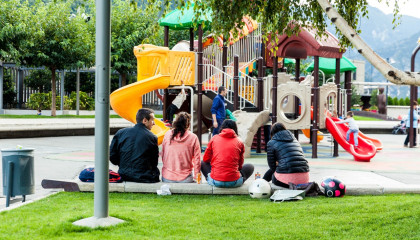You are here: Help with your childcare costs
Childcare can be expensive but there is help available towards the costs of childcare. This guide covers the various support options that may be available to you. For information about the additional support available if your child has a special educational need or disability, check our 'Guide to childcare for children with special educational needs and disabilities in England'.

Free childcare and education
If your child is aged two, three or four you might be able to get free early education and childcare. What you get depends on how old your child is, where you live, and your family circumstances.
You need to use approved childcare: this means a registered childminder, play scheme, nursery, or club, a nursery class in a school, or a home care worker working for a registered agency.
In England, Scotland and Wales you will usually become eligible in the term after your child’s birthday. For example, if your child turns three on 13 October, you will be able to get free childcare from January. In Northern Ireland, you will be eligible the year before your child enters Primary One.
England
Two year olds
You can get free childcare for a two year old if you receive certain benefits, if your child has a disability, or if they have been looked after by the local authority. You can find out whether you are eligible for the free childcare offer for two year olds here. If you are eligible, you can get 15 hours of free childcare a week for 38 weeks a year (570 hours in total).
Three and four year olds
All three and four year olds can get 15 hours of free childcare a week for 38 weeks a year (570 hours in total) until the child starts reception year at school. Contact your local authority or speak directly to your childcare provider to find out more. You can find your local authority’s contact information by using our Childcare Finder here.
You might be able to get an additional 15 hours of free childcare a week if you are in work, giving you a total of 30 hours a week for 38 weeks a year (1140 hours in total). To be eligible for this, you must be a single parent in work, or part of a couple where both parents are in work, and:
- You, or you and your partner, must earn at least 16 hours per week at the minimum wage (if you are under 25) or the Living Wage (if you are over 25)
- Neither of you must earn more than £100,000 per year
You can apply for the extra 15 hours of free childcare for working parents here.
If you do not meet the earnings criteria, you may still be eligible if:
- You are in a couple and your partner earns enough, but you do not because you are a carer, you are ill or disabled, or you are on parental leave, annual leave or sick leave.
- You are self-employed and you started your business in the past 12 months.
Your eligibility may be affected by your immigration status if it means that you do not have access to public funds.
You can choose the provider where you want to use your free childcare, and you may be able to ‘stretch’ your childcare hours through the year, for example to get 11.4 hours per week for 50 weeks a year. You can split your free childcare between different providers, and you may be able to pay your provider for extra hours of childcare beyond the free entitlements.
Northern Ireland
You can get funded preschool education in a nursery school, primary school with nursery class, or from some private and voluntary providers. This is available the year before your child enters Primary One. You can find out how to apply for funded preschool education here.
Scotland
Two year olds
You can get free childcare for a two year old if you receive certain benefits, or if your child has been looked after by the local authority. You find out if you are eligible for free childcare for two year olds here. go to. If you are eligible, you can get 1140 hours of free childcare a year.
Three and four year olds
All three and four year olds can get 1140 hours of free childcare. Contact your local authority to find out more.
Wales
Three and four year olds
All three and four year olds can get a minimum of 10 hours of free, part-time Foundation Phase education in a school, or funded nursery. Some local authorities offer more than this. To find out more, contact your local authority.
Three and four year old extended entitlement
The Welsh government intends to offer 30 hours per week of free childcare for 48 weeks a year to working parents. At the moment, this is being piloted in seven local authorities. You can find out whether you live in one of these authorities here.
Flying Start areas
If you live in a Flying Start area, you can get 2.5 hours of free childcare a day for 5 days a week, 39 weeks a year when your child turns two. To find out whether you are eligible, contact your local authority.
Tax Free childcare
Tax Free Childcare is paid to help parents in work with the cost of childcare. The government will add £2 for every £8 you pay for childcare, up to a maximum of £2000 per child per year (or £4000 per year if your child is disabled). You can only use it for approved childcare. This means a registered childminder, play scheme, nursery, or club, a registered school, or a home care worker working for a registered agency.
You can apply for Tax Free Childcare if:
- Your child is aged under 12, or under 17 if they have a disability
- You are a single parent and you are earning the equivalent of at least 16 hours per week at the minimum wage (if you are under 25) or the Living Wage (if you are over 25)
- You are part of a couple and you are both earning this amount, or one of you is earning and the other is unable to work due to illness, disability, or caring responsibilities
- You (and your partner if you have one) are earning less than £100,000 per year
- You are self-employed and you started your business in the past 12 months
After being gradually introduced, as of 14 February 2018 Tax Free Childcare is now available for all families with children under 12 years old. Your eligibility may be affected by your immigration status if it means that you do not have access to public funds.
You can apply now for Tax Free Childcare here.
You can’t receive Tax Free Childcare and Universal Credit or Working Tax Credit at the same time. You can use the government’s Childcare Calculator to find out which option is better for you: this will depend on your family circumstances.
Universal Credit or Working Tax Credit
Working Tax Credit and Universal Credit are paid to people in work to top up low wages. This includes earnings from employment and earnings if you are self-employed.
Working Tax Credit is gradually being phased out and replaced by Universal Credit. When you apply for benefits for the first time, you will be told whether to apply for Universal Credit or Working Tax Credit: this depends on where you live. If you are currently on Working Tax Credit, you will be transferred to Universal Credit at some point. You cannot get Universal Credit and Working Tax Credit at the same time.
For both Universal Credit and Working Tax Credit you must use approved childcare. This means a registered childminder, play scheme, nursery, or club, a registered school, or a home care worker working for a registered agency.
If you are receiving either Universal Credit or Working Tax Credit, it’s important to report changes to your circumstances so you continue to receive the right amount.
Eligibility for Working Tax Credit
You can get the Childcare Element of Working Tax Credit if:
- You are a single parent and you are in work for at least 16 hours a week
- You are part of a couple and you are both in work for at least 16 hours a week
With Working Tax Credit, you can get up to 70 per cent of your childcare costs covered up to a maximum of £122.50 per week for one child in childcare, or £210 for two or more children. The amount you get will depend on your family circumstances.
Eligibility for Universal Credit
You can get the Childcare Element of Universal Credit if:
- You are a single parent and you are in work
- You are part of a couple and you both work, or one of you works and one is unable to work because they are ill, a carer for someone else, or absent from the household
With Universal Credit, you can get up to 85 per cent of your childcare costs covered up to a maximum of £646 per month for one child in childcare or up to £1108 with two or more children. The amount you get will depend on your family circumstances.
You can apply for Universal Credit here and for Working Tax Credit here.
Childcare vouchers
Your employer may provide childcare vouchers, which mean you do not have to pay tax on some of your childcare costs. You can get information about this from your employer’s HR department. Depending on how much you spend and when you joined the scheme, you can get up to £55 per week.
Childcare vouchers are being phased out because of the introduction of Tax Free Childcare. If you are already using childcare vouchers, you can continue to use them, or you can change to Tax Free Childcare. Whether you are better off on childcare vouchers or Tax Free Childcare will depend on your personal circumstances. You can use the government’s Childcare Calculator to find out which option is better for you: this will depend on your family circumstances.
Which option is best for me?
Each family has its own unique needs and set of circumstances. If you are unsure about which option to go with towards your childcare costs, you can use the government's Childcare Choices website and Childcare Calculator to compare the support you can get from the different options you may be eligible for.

Was this guide helpful? If so, please share it so more parents can find childcare that works for them and their family!
More guides that may be useful
Where to find information about local childcare
Here are some of the places where you can find out about the childcare services available in your local area.
Five steps to choosing childcare
Video and step by step guide to help you choose childcare that works for you and your child.
Guide to childcare for children with special educational needs and disabilities in England
Find and choose the right childcare, understand the financial and local support available to you, and know your rights are as a parent.
Sign up to our newsletter
Get the latest news, research and resources from Coram Family and Childcare.




